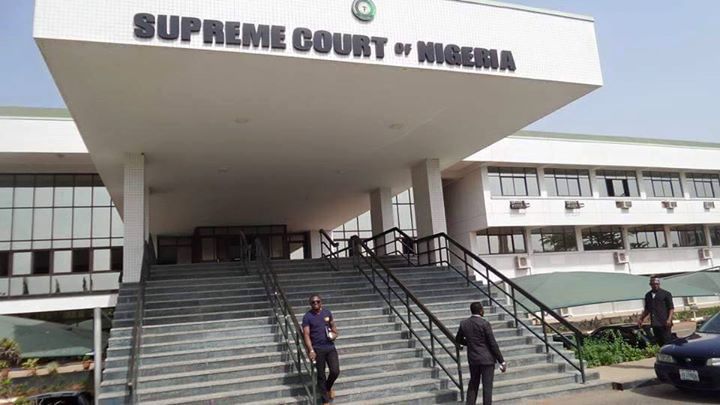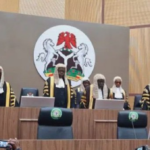In reaction to mounting criticism over their contentious judgments, the Supreme Court’s Director of Press and Information has gone on the offensive, warning Nigerians to be mindful of “unwarranted” attacks on judicial officers. Although he referred to some critics of the Supreme Court as ignorant and infantile, he conceded that every Nigerian citizen had an inalienable right to express their opinion without hindrance. His plea that even in a state of emotional disequilibrium, critics should be reasonable and choose decent words to communicate their grievances is well taken. There is far too much abusive language flowing about these days. However, he did not make it clear how it is possible to use decent words to describe indecent behaviour.
The Supreme Court is undeniably losing respect because of its seeming inability to deliver judgments which appeal to common sense and justice. Common sense is sound practical judgment concerning everyday matters, it’s an ability to perceive, understand and judge in a manner that is shared by all right thinking people. Defying common sense means not reaching intelligent conclusions and not reasoning sensibly.
Supreme Court judgments, although final and binding, must pass through public scrutiny and logical analysis because when judges sit on cases, they themselves are on trial. The honourable justices of the apex court have earned a reputation for passing judgments in political cases which are repugnant to common sense, especially where they have installed governors and legislators who didn’t win election. Their ruling in Imo State was particularly galling and scandalous. Rather than order a rerun election, the court affirmed the ruling party’s candidate who came fourth in the polls as the “winner”.
The latest absurdity, which also leaves a sour taste in the mouth, is the recent shocking judgment concerning Senate President, Ahmad Lawan, in a Yobe senatorial primary. In a ruling, which defies logic and cannot be explained using common sense, the apex court declared Lawan, who did not contest the primary, as the winner! Fortunately, the reputation of the justices was redeemed in the minority judgment by Justices Emmanuel Agim and Adamu Jauro who truthfully said Lawan never participated in the official primary which his opponent won.
Despite Supreme Court order, Nigerians reject old Naira notes
Supreme Court: Dispensing with commonsense
Justices of the apex court are doing a disservice to the judiciary and bringing lower courts into disrepute by overturning judgments on a whim of technicalities. Nigerians are being taught not to respect declarations of lower courts but find enough funds to take cases to the Supreme Court and obtain judgments where there is no appeal. Lawan lost his case at the Federal High Court, Damaturu, and also lost at the Court of Appeal in Abuja, but inexplicably won in the Supreme Court which appears to routinely pass judgments which defy common sense.
Obi Nwabueze, a law professor and Senior Advocate of Nigeria (SAN), accused them of playing “a discreditable part” in undermining the reputation of the judiciary. He believes they fail to appreciate that the question of who should rule Nigeria isn’t to be decided by perverse and narrow legalism, by the technicalities of the rules of evidence, or by consideration of practice, procedure or expediency.
The judiciary which should be the bastion of democracy is positioning itself to be its undertaker! To restore confidence in the Supreme Court, it’s vital for justices to make rulings without interference or bias based solely on law, facts and the desire to dispense justice.
The legendary Justice Lord Denning, a former Master of the Rolls in the UK, famously pointed out, written boldly over the entrance to his court: “Temple of justice”, hence that he would “not allow people to use the law to escape justice. The Supreme Court routinely allows this to happen. Their business is to dispense justice by creating legal precedence, not to dispense injustice by pedantically upholding legal technicalities. The Human Rights Writers Association of Nigeria (HURIWA) claims Nigerians are thoroughly displeased with “distorted and incredibly ridiculous” judgments coming from the Supreme Court and accused the Chief Justice of Nigeria (CJN) of attempting to intimidate, verbally harass, threaten or prevent Nigerians from giving their constitutionally protected opinion on how badly the justice system in Nigeria is being piloted.
Although the Nigerian justices have grievances, there complaints are not about jurisprudence, perverse judgments, constitutional matters or indeed superficial understanding of legal technicalities, but rather they are centred on official corruption, administrative ineptitude, and their personal welfare.
While asserting that the law is not based upon common sense, legal luminaries are joining members of the public to express grave concerns about outside influences, lack of trust, allegations of corruption and lack of common sense in Supreme Court judgments. They decry the growing lack of confidence in the judicial system. Nigerians increasingly believe the judiciary has become a political tool which is no longer impartial, independent or transparent. Justice in Nigeria must re-invent itself to restore public confidence. The Nigerian Supreme Court is supposed to be “the last hope of the common man”. Surely, it is not too much to ask that their judgments are not repugnant to common sense?

 Join Daily Trust WhatsApp Community For Quick Access To News and Happenings Around You.
Join Daily Trust WhatsApp Community For Quick Access To News and Happenings Around You.

